40 news posts
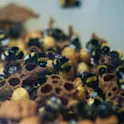
Featured news
10 Apr 2025
How to protect bumblebee colonies safe from killer moths? Keep honeybee hives away from them
Researchers have shown for the first time that bumblebee colonies are more likely to become infested with bumblebee wax moths as they are closer to nearby honeybee hives, which can likewise host these potentially devastating parasites. As the distance to the apiaries decreased, bumblebee colonies were less productive, while their workers showed a weaker general immune response to pathogens and parasites. The authors advise honeybee keepers to keep apiaries away from habitats rich in bumblebees, which are important pollinators but declining worldwide.
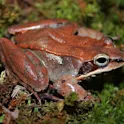
Featured news
26 Mar 2025
Tadpoles try to flee dangerous virus in their pond by growing much faster than normal
Researchers from the US studied the plasticity in growth and development of wood frog larvae in response to the emerging disease ranavirus, which can kill off the entire population of ponds. They showed that tadpoles in infected ponds speed up the rate of growth and progression through the immature stages. They hypothesize that this plasticity boosts their physical condition and hence immune response to ranavirus, and allows them to metamorphose earlier and escape infection.
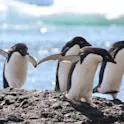
Featured news
20 Mar 2025
Mere whiff of penguin poo pushes krill to take frantic evasive action
Scientists have shown for the first time that Antarctic krill show a stereotypical reaction in the presence of guano from Adélie penguins: they swim faster and make more turns over greater angles. It is unknown to what kind of water-borne chemical cues they respond, but the authors speculate that this behavior might be a universal escape response to the excreta of predators, irrespective of species.

Featured news
27 Feb 2025
Taking sports science in her stride: how Dr Nerea Casal García aims to maximise performance on the track
Casal García is the corresponding author of a new article in Frontiers in Sports and Active Living, which reveals a pronounced recent shift of stride patterns during elite women's 400 meters hurdle competitions. She has kindly taken the time to share some thoughts about her career and research as part of our Frontier Scientist series.

Featured news
21 Feb 2025
Hurricane-proofed downtown skyscrapers unexpectedly vulnerable to ‘bouncing’ winds
In May 2024, a type of windstorm called derecho caused considerable damage to the facades of Houston’s tall buildings, which had been designed to withstand stronger, hurricane-strength winds. In contrast, hurricane Beryl in July 2024 caused only minimal damage to the same buildings. Researchers analyzed the damage from this derecho and used wind-tunnel modeling to simulate its unique wind loading effects on miniature tall buildings. They concluded that besides interference between groups of tall buildings, the unique characteristics of local events like derechos worsened the structural damage. This finding has implications for the design of future tall buildings and urban planning.
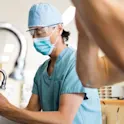
Featured news
14 Feb 2025
Dangerous bacteria lurk in hospital sink drains, despite rigorous cleaning
Researchers from Spain sampled sink drains from different wards in a single modern university hospital where state-of-the-art cleaning protocols are adhered to. Through culturing and DNA barcoding, they found 67 species of bacteria. These included Klebsiella, Enterobacter, and Pseudomonas aeruginosa, notorious for their potential to cause healthcare-associated infections. Several strains detected proved resistant to modern antibiotics, including cephalosporins and carbapenems. Sink drains thus appear to function as reservoirs for known and emerging pathogens of concern.

Featured news
12 Dec 2024
Sleepers made from recycled plastic could make railways even more eco-friendly
Part of the greenhouse gas (GHG) emissions from railways lie in the energy used to produce and maintain the necessary infrastructure. Researchers from Finland here showed the feasibility of using more eco-friendly railway sleepers from two types of recycled plastic, liquid packaging board and acrylonitrile butadiene styrene. Carbon emissions saved each year by phasing out concrete sleepers and replacing them with such recycled plastic could amount to the equivalent of heating for 1,200 Finnish households.

Health
04 Dec 2024
Broken sleep a hallmark sign of living with this common liver disease, scientists find
Researchers from Switzerland have shown that patients with metabolic dysfunction-associated steatotic liver disease (MASLD) suffer poor sleep due to sleep fragmentation and wakefulness. Patients with the more severe form metabolic dysfunction–associated steatohepatitis (MASH) or with cirrhosis, but not healthy volunteers, experienced similar sleep disturbances. Whether poor sleep causes MASLD or vice versa isn’t yet clear. A single sleep hygiene education session proved insufficient to sustainably improve sleep quality and quantity.
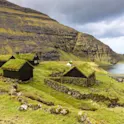
Featured news
25 Nov 2024
Viking colonizers of Iceland and nearby Faroe Islands had very different origins, study finds
Geneticists have studied the distribution of Y-chromosome haplogroups on the Faroe Islands, known to have been colonized by Vikings around the year 900 CE, and compared these to distributions of haplogroups in today’s Scandinavia. They showed with novel analysis methods that the haplotype distribution in the Faroe Islands most closely resembled that in Norway and Denmark, and to a lesser extent that in Sweden, but differed from that in Iceland. They concluded that a band of Viking men from all over Scandinavia colonized the Faroe Islands, which differed in their geographical origin and genetic make-up from those who settled Iceland.

Featured news
15 Nov 2024
Students who use dating apps take more risks with their sexual health
Researchers from the US looked for associations between the use of dating apps, sexual behavior, and a history of HIV/STIs among college students in North Texas. They showed that there was an association between risky sexual behavior and the use of dating apps. They propose that the two may be mutually reinforcing.

Life sciences
18 Oct 2024
Scientists create new overwintering sites for monarch butterflies on a warming planet
Migrating monarch butterflies depend on mountain forests of sacred firs in Mexico as overwintering sites. These forests are under threat from global warming. But researchers from Mexico have now shown that seedlings derived from their original range can be transplanted successfully to a new site further east, on the higher and colder volcano Nevado de Toluca. The resulting new stand of sacred firs could ultimately serve as the overwintering sites of the future.
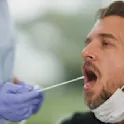
Featured news
01 Oct 2024
‘Cheeky’ discovery allows scientists to estimate your risk of dying using cells found in the mouth
Over the past decade, several epigenetic clocks have been developed to track physiological aging. Until recently, all had been based on the DNA methylome of blood cells – onerous and stressful to collect. But now, scientists from the US have shown for the first time that their new epigenetic clock CheekAge, which uses easy-to-collect cheek cells, can accurately predict mortality. This suggests that cheek swabs could be an improved way to measure and predict healthy vs unhealthy aging and mortality in humans.

Featured news
20 Sep 2024
Oceanic life found to be thriving thanks to Saharan dust blown from thousands of kilometers away
Scientists from the US measured the relative amounts of ‘bioreactive’ iron in four sediment cores from the bottom of the Atlantic. They showed for the first time that the further dust is blown from the Sahara, the more iron in it becomes bioreactive through chemical processes in the atmosphere. These results have important implications for our understanding of the growth-promoting effect of iron on oceanic phytoplankton, terrestrial ecosystems, and carbon cycling, including under global change.
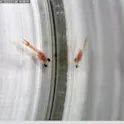
Featured news
17 Sep 2024
How does a tiny shrimp find its way home in a vast ocean? Study finds it’s down to their cave’s special smell
Researchers from France have shown for the first time that mysid shrimp can distinguish between seawater from their cave of origin and that from nearby caves. This recognition behavior, based on local differences in water-borne odor mixes or ‘chemical seascapes’, is likely what enables the shrimp’s homing behavior when they return each dawn from their foraging trips in open water.
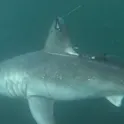
Featured news
03 Sep 2024
Large sharks may be hunting each other – and scientists know because of a swallowed tracking tag
A surprise killing of a pregnant porbeagle shark being tracked near Bermuda left researchers trying to solve an oceanic mystery. From the transmitted data, they were shocked to discover that it was likely eaten by an even larger shark, in what is the first recorded case of its kind